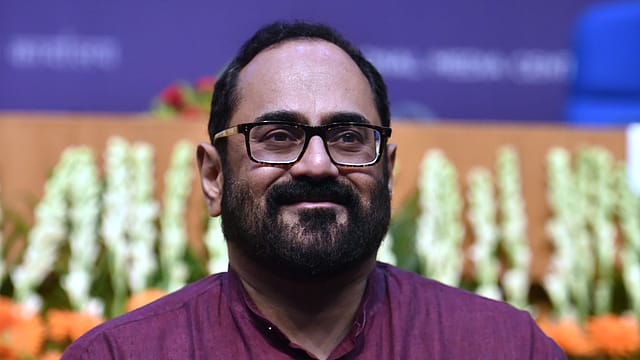India to probe misuse of phone mic by WhatsApp, Google
ADVERTISEMENT

Minister of State for Electronics and Information Technology (MeitY) Rajeev Chandrasekhar on Wednesday called the alleged use of smartphone microphones in the background by messaging giant WhatsApp an unacceptable breach and violation of privacy.
The Union minister tweeted about the issue after Twitter engineer Foad Dabiri accused WhatsApp of using the microphone in the background while he was asleep. Dabiri said he uses a Google Pixel 7 Pro smartphone.
India is one of the biggest markets for WhatsApp, where it has the most monthly active users at nearly 400 million.
Chandrasekhar said the government will examine this immediately and will act on any violation of privacy.
Following the tweet by his employee, Tesla chief Elon Musk said 'WhatsApp cannot be trusted' and urged his followers to 'trust nothing, not even nothing'.
"WhatsApp founders left Meta/Facebook in disgust, started #deletefacebook campaign & made major contributions to building Signal. What they learned about Facebook & changes to WhatsApp obviously disturbed them greatly," Musk wrote.
January 2026
Netflix, which has been in India for a decade, has successfully struck a balance between high-class premium content and pricing that attracts a range of customers. Find out how the U.S. streaming giant evolved in India, plus an exclusive interview with CEO Ted Sarandos. Also read about the Best Investments for 2026, and how rising growth and easing inflation will come in handy for finance minister Nirmala Sitharaman as she prepares Budget 2026.
Meanwhile, Meta-owned WhatsApp has dismissed Dabiri's claim, saying this is a bug on Android that 'mis-attributes' information in their privacy dashboard. "Over the last 24 hours we've been in touch with a Twitter engineer who posted an issue with his Pixel phone and WhatsApp. We believe this is a bug on Android that mis-attributes information in their Privacy Dashboard and have asked Google to investigate and remediate," the company said.
WhatsApp claimed that users have full control over their mic settings. "Once granted permission, WhatsApp only accesses the mic when a user is making a call or recording a voice note or video - and even then, these communications are protected by end-to-end encryption so WhatsApp cannot hear them," the messaging giant said.
This comes at a time when several users in India complained about getting missed calls on WhatsApp from unknown international numbers. Most of these calls come from phone numbers that begin with country codes such as +880 (Bangladesh), +251 (Ethiopia), +60 (Malaysia), +62 (Indonesia), +254 (Kenya), and +84 (Vietnam) among others. Mobile phone users in India get nearly 17 spam calls on average per month, according to a Truecaller. The vast majority 93.5% of all spam in India are sales or telemarketing calls.
In January 2021, India's antitrust regulator launched a probe against WhatsApp for sharing users' data with its parent Meta. The Competition Commission of India (CCI) is investigating WhatsApp and Facebook over alleged violations of users' privacy and competition norms.
